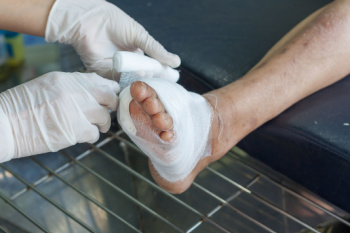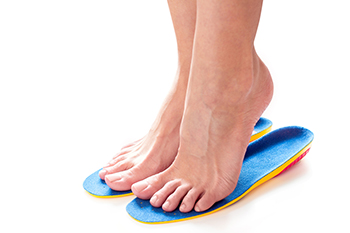Connect With Us
Blog
Items filtered by date: August 2024
Effective Stretches for Your Foot Arch

Stretching the arch of the foot can alleviate discomfort and improve flexibility. One simple method involves sitting in a chair and placing one foot over the opposite knee. Gently use your hand to pull your toes back toward your shin, feeling a stretch along the arch. Another effective stretch involves standing and placing one foot behind you on a low step, keeping the heel on the ground while leaning forward slightly. This helps to stretch the muscles and tendons along the bottom of the foot. Additionally, rolling a tennis ball under your foot while seated can help release tension in the arch. If you have pain in the arch of your foot, it is suggested that you consult a podiatrist who for a diagnosis and treatment options.
Stretching the feet is a great way to prevent injuries. If you have any concerns with your feet consult with one of our podiatrists from Fox Valley Foot and Ankle Specialists. Our doctors will assess your condition and provide you with quality foot and ankle treatment.
Stretching the Feet
Stretching the muscles in the foot is an important part in any physical activity. Feet that are tight can lead to less flexibility and make you more prone to injury. One of the most common forms of foot pain, plantar fasciitis, can be stretched out to help ease the pain. Stretching can not only ease pain from plantar fasciitis but also prevent it as well. However, it is important to see a podiatrist first if stretching is right for you. Podiatrists can also recommend other ways to stretch your feet. Once you know whether stretching is right for you, here are some excellent stretches you can do.
- Using a foam roller or any cylindrical object (a water bottle or soda can will do), roll the object under your foot back and forth. You should also exert pressure on the object. Be sure to do this to both feet for a minute. Do this exercise three times each.
- Similar to the previous one, take a ball, such as a tennis ball, and roll it under your foot while seated and exert pressure on it.
- Grab a resistance band or towel and take a seat. If you are using a towel, fold it length wise. Next put either one between the ball of your foot and heel and pull with both hands on each side towards you. Hold this for 15 seconds and then switch feet. Do this three times for each foot.
- Finally hold your big toe while crossing one leg over the other. Pull the toe towards you and hold for 15 seconds. Once again do this three times per foot.
It is best to go easy when first stretching your foot and work your way up. If your foot starts hurting, stop exercising and ice and rest the foot. It is advised to then see a podiatrist for help.
If you have any questions, please feel free to contact our office located in Naperville, IL . We offer the newest diagnostic and treatment technologies for all your foot care needs.
Wounds That Don't Heal Need to Be Checked
Laser Therapy for Diabetic Neuropathy

Laser therapy is emerging as a promising treatment for diabetic neuropathy, a condition caused by nerve damage that can lead to pain, tingling, and numbness, especially in the feet. Laser therapy involves using light to stimulate the damaged nerve cells, which promotes regeneration and potentially alleviates symptoms. Some studies have shown positive results, particularly with deep-tissue laser therapy. However, there remains debate over its overall effectiveness due to variations in research methods and laser types. Deep-tissue lasers, with their ability to penetrate further into the body, have been noted for their potential in reducing pain for diabetic neuropathy patients. However, more extensive research is needed to establish definitive guidelines for laser therapy's application in neuropathy. A podiatrist can evaluate individual cases and recommend the most suitable laser treatment options. They can also guide patients on the number of sessions required and discuss cost considerations, which can vary based on treatment specifics. If you have foot problems caused by diabetic neuropathy, it is suggested that you schedule an appointment with a podiatrist to find out if laser therapy is right for you.
Neuropathy
Neuropathy can be a potentially serious condition, especially if it is left undiagnosed. If you have any concerns that you may be experiencing nerve loss in your feet, consult with one of our podiatrists from Fox Valley Foot and Ankle Specialists. Our doctors will assess your condition and provide you with quality foot and ankle treatment for neuropathy.
What Is Neuropathy?
Neuropathy is a condition that leads to damage to the nerves in the body. Peripheral neuropathy, or neuropathy that affects your peripheral nervous system, usually occurs in the feet. Neuropathy can be triggered by a number of different causes. Such causes include diabetes, infections, cancers, disorders, and toxic substances.
Symptoms of Neuropathy Include:
- Numbness
- Sensation loss
- Prickling and tingling sensations
- Throbbing, freezing, burning pains
- Muscle weakness
Those with diabetes are at serious risk due to being unable to feel an ulcer on their feet. Diabetics usually also suffer from poor blood circulation. This can lead to the wound not healing, infections occurring, and the limb may have to be amputated.
Treatment
To treat neuropathy in the foot, podiatrists will first diagnose the cause of the neuropathy. Figuring out the underlying cause of the neuropathy will allow the podiatrist to prescribe the best treatment, whether it be caused by diabetes, toxic substance exposure, infection, etc. If the nerve has not died, then it’s possible that sensation may be able to return to the foot.
Pain medication may be issued for pain. Electrical nerve stimulation can be used to stimulate nerves. If the neuropathy is caused from pressure on the nerves, then surgery may be necessary.
If you have any questions, please feel free to contact our office located in Naperville, IL . We offer the newest diagnostic and treatment technologies for all your foot care needs.
Custom Orthotics For Teen Athletes

Parents, support your athletic teens with Custom Orthotics! As they excel in sports and activities, their feet need optimal care. Custom Orthotics provide the right alignment, reducing fatigue and enhancing performance. They help absorb shocks, minimize injuries, and cater to their unique foot structure. Don't let foot discomfort sideline their passion. Invest in their comfort and athletic future by choosing Custom Orthotics from our office. Call today for an appointment.
Complications of Diabetes That Affect the Feet

Diabetes often leads to complications that affect the feet, including peripheral neuropathy. This condition damages peripheral nerves that are responsible for sending signals to the lower limbs and feet. Peripheral neuropathy causes symptoms like tingling, numbness, muscle cramps, and sharp or burning pain. Reduced sensation makes diabetic patients more susceptible to injuries from sharp objects or ill-fitting shoes, as they might not feel pain or pressure. Consequently, small wounds can go unnoticed, leading to infections and potentially severe complications like diabetic foot ulcers. These ulcers may worsen due to poor circulation, which hinders healing and can result in infections spreading to the bone, sometimes necessitating amputation. Managing these issues involves regular foot examinations, wearing proper footwear, and maintaining good blood sugar levels. A podiatrist can provide specialized care to manage symptoms, prevent further complications, and promote foot health. If you have complications of diabetes that are affecting your feet, it is suggested that you add a podiatrist to your medical team.
Diabetic foot care is important in preventing foot ailments such as ulcers. If you are suffering from diabetes or have any other concerns about your feet, contact one of our podiatrists from Fox Valley Foot and Ankle Specialists. Our doctors can provide the care you need to keep you pain-free and on your feet.
Diabetic Foot Care
Diabetes affects millions of people every year. The condition can damage blood vessels in many parts of the body, especially the feet. Because of this, taking care of your feet is essential if you have diabetes, and having a podiatrist help monitor your foot health is highly recommended.
The Importance of Caring for Your Feet
- Routinely inspect your feet for bruises or sores.
- Wear socks that fit your feet comfortably.
- Wear comfortable shoes that provide adequate support.
Patients with diabetes should have their doctor monitor their blood levels, as blood sugar levels play such a huge role in diabetic care. Monitoring these levels on a regular basis is highly advised.
It is always best to inform your healthcare professional of any concerns you may have regarding your feet, especially for diabetic patients. Early treatment and routine foot examinations are keys to maintaining proper health, especially because severe complications can arise if proper treatment is not applied.
If you have any questions please feel free to contact our office located in Naperville, IL . We offer the newest diagnostic and treatment technologies for all your foot and ankle needs.
Types of Foot Orthotics and Their Uses

Foot orthotics come in various types, each tailored to specific foot conditions and biomechanical issues. Accommodative orthotics are designed to provide cushioning and support, ideal for diabetic foot care or relieving pressure points. Functional orthotics focus on correcting abnormal foot mechanics like overpronation or supination, improving alignment during movement, and reducing strain on muscles and joints. Sports orthotics are crafted for athletes to enhance performance and prevent injuries by offering additional support and stability. Corrective orthotics are custom-made to address structural abnormalities such as high arches or flat feet, promoting optimal foot function and reducing pain. Understanding these different types helps individuals choose the right orthotic for their needs, whether it is for everyday comfort, sports performance, or therapeutic purposes. Consulting with a podiatrist ensures that orthotics are properly fitted and customized to provide the best possible support and relief for foot-related issues. If you are considering wearing orthotics to correct a specific foot condition, it is suggested that you consult with this type of doctor who can guide you toward making appropriate choices.
If you are experiencing discomfort in your feet and would like to try custom orthotics, contact one of our podiatrists from Fox Valley Foot and Ankle Specialists. Our doctors can provide the care you need to keep you pain-free and on your feet.
What Are Custom Orthotics?
Custom orthotics are inserts you can place into your shoes to help with a variety of foot problems such as flat feet or foot pain. Orthotics provide relief and comfort for minor foot and heel pain.
Over-the-Counter Inserts
Shoe inserts come in a wide variety and are used to treat foot pain, heel pain, and minor problems. For example, arch supports can be inserted into your shoes to help correct overarched or flat feet, while gel insoles are often used because they provide comfort and relief from foot and heel pain by alleviating pressure.
Prescription Orthotics
If over-the-counter inserts don’t work for you or if you have a more severe foot concern, it is possible to have your podiatrist prescribe custom orthotics. These high-quality, custom inserts are designed to treat problems such as abnormal motion, plantar fasciitis, and severe forms of heel pain. They can even be used to help patients suffering from diabetes by treating foot ulcers and painful calluses and are usually molded to your feet individually, which allows them to provide full support and comfort.
If you're experiencing minor to severe foot or heel pain, it’s recommended to speak with your podiatrist about the possibility of using custom orthotics or shoe inserts. A podiatrist can determine which type of custom orthotic or shoe insert is right for you and help you take the first steps toward being pain-free.
If you have any questions please contact our office located in Naperville, IL . We offer the newest diagnostic and treatment technologies for all your foot and ankle needs.
Various Causes of Heel Pain

There are many types of disorders that cause pain in the heel. The most common cause of heel pain is plantar fasciitis, an inflammation of the plantar fascia tissue that runs along the bottom of the foot. Other common sources of heel pain include a calcaneal, or heel bone, fracture, and heel pad syndrome, which is a wearing down of the cushion on the bottom of the heel. Other causes of heel pain are nerve entrapment, including tarsal tunnel syndrome, which can also cause tingling, numbness or burning, and neuromas, or nerve swelling. Achilles tendinopathy, or damage to the tendon that attaches the calf muscles to the heel bone, may result in heel pain. Growing active children may be prone to Sever’s disease, which is irritation in the growth plate of the heel. A podiatrist will typically begin an evaluation by asking where the pain is located, along with some family medical history questions followed by a physical examination. This foot doctor may use various diagnostic tools to determine the underlying cause of your heel pain and how best to treat it. If you have heel pain, it’s suggested that you make an appointment with a podiatrist.
Many people suffer from bouts of heel pain. For more information, contact one of our podiatrists of Fox Valley Foot and Ankle Specialists. Our doctors can provide the care you need to keep you pain-free and on your feet.
Causes of Heel Pain
Heel pain is often associated with plantar fasciitis. The plantar fascia is a band of tissues that extends along the bottom of the foot. A rip or tear in this ligament can cause inflammation of the tissue.
Achilles tendonitis is another cause of heel pain. Inflammation of the Achilles tendon will cause pain from fractures and muscle tearing. Lack of flexibility is also another symptom.
Heel spurs are another cause of pain. When the tissues of the plantar fascia undergo a great deal of stress, it can lead to ligament separation from the heel bone, causing heel spurs.
Why Might Heel Pain Occur?
- Wearing ill-fitting shoes
- Wearing non-supportive shoes
- Weight change
- Excessive running
Treatments
Heel pain should be treated as soon as possible for immediate results. Keeping your feet in a stress-free environment will help. If you suffer from Achilles tendonitis or plantar fasciitis, applying ice will reduce the swelling. Stretching before an exercise like running will help the muscles. Using all these tips will help make heel pain a condition of the past.
If you have any questions please contact our office located in Naperville, IL . We offer the newest diagnostic and treatment technologies for all your foot and ankle needs.

